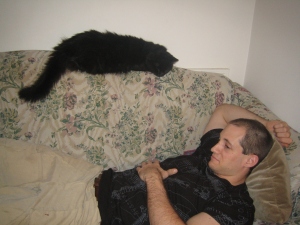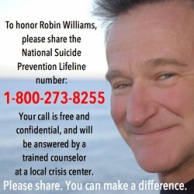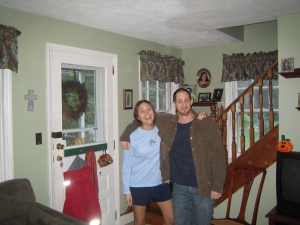Last week I watched some of the Simpsons Marathon (that’s right, they aired every episode EVER on Fxx) in memory of my brother, Jesse, who died a few years ago. Yes, I have to close my eyes when the Itchy and Scratchy Show comes on, and I am aware that some Christians feel personally attacked by the show’s portrayal of Ned Flanders, but what the hay, neighbor, let’s get past all that, since it’s not what I’m writing about.

When he was depressed, Jesse would spend a lot of time on my parents’ couch in the den, watching reruns of his favorite shows (The Simpsons, Boy Meets World, Seinfeld) and whatever films were being aired on TV. I can picture him snuggled under an afghan, with our cat Charlie. He wasn’t a lay-around kind of person, but sometimes that’s what depression looks like – a head full of turmoil and tension hidden under a layer of lethargy. I think it was his way of trying to comfort himself. This is not a tribute to TV and films, but there is something comforting about them, especially the old, familiar ones. They engage you while allowing you to be completely relaxed. In that way, they are like old friends, but they don’t expect anything back.
I think that is one of the reasons why the death of Robin Williams strikes at the heart of America. A lot of us grew up with his movies and thought of him as an old friend. For me it was Aladdin, Jumanji and Hook; movies I loved when I was young, as only a child can do. After watching one of these, I would spend days imagining that I lived in the world created by the film, that I was part of the story.
Another reason that it strikes at our hearts is that our old friend didn’t just die, but he took his own life. It reminds us that someone who made a living by bringing laughter to people could be so sad that he could not hope to feel joy himself, that he had reached a point of pain that felt unbearable.
reason that it strikes at our hearts is that our old friend didn’t just die, but he took his own life. It reminds us that someone who made a living by bringing laughter to people could be so sad that he could not hope to feel joy himself, that he had reached a point of pain that felt unbearable.
Like Robin Williams, my brother struggled with depression. He, too, was a creative and sensitive person, who was very good at making people laugh (and sometimes cry.) And like Robin Williams, he took his own life. And that is how I know that as Robin Williams’ death fades quickly from the news and from most of our minds, those who knew and loved him personally are only beginning their season of sorrow.
They will continue to be crushed by imagining what was going on in his mind at the end of his life, jarred by the images of his death so graphically and publicly described, and distressed by the common and constant plague of survivors of suicide loss – the what ifs. What if I had been more in-tune with his emotions? What if I had called him that night like I’d meant to? What if I’d said something differently? What if I had been a better… sibling/parent/child/friend? Would he still have felt the need to go?
I understand and have experienced the desire to blame someone when we are in pain, whether it’s ourselves, or someone else. I spoke to a woman recently who had just lost her father to suicide. She said, several times, that he always was a selfish bastard. I have heard professionals blame parents and parents blame professionals. I’ve heard people pin it on medication, malpractice, substance abuse, bullying. But the truth is, suicide is complex, and rarely the result of one factor. And when it comes down to it, the human condition is to blame. We live in a broken world, and we desperately desire hope and freedom from the tears we that we cry and the pain that we feel. I think you’d be hard-pressed to find a person who has never thought about it all being over for a moment.

But in the midst of all that, life is beautiful, and hope exists. And that’s why for most of us, that fleeting thought doesn’t lead us to consider killing ourselves. So after losing a loved one to suicide, most of us eventually come to a place where we can begin to be comforted, and can reach out to others, for help or to offer hope. SOS (Survivors of Suicide) support groups meet around the country where people are able to share their stories, and talk about what has helped them begin to heal. For me, this is my faith. Warning: this is where my proselytizey-ness comes out.
I have great hope because I believe in a God whose grace is sufficient to cover my lack of love and unwillingness to reach out to the wounded; whose grace is sufficient to cover a person’s decision to give up because they feel their pain is too much to bear; whose grace is sufficient for those (like myself) working in a mental health system that sometimes fails to prevent such decisions. I believe in a God who ordains our days and has a sovereign plan, even through the worst of tragedies. In other words, I am finally humble enough to believe in a God who knows better than me.
Through my work, I have also spoken to ministers who have told me that suicide is the unforgivable sin, because you can’t repent of it. Now friends, if I haven’t remembered to repent (or even noticed) every time I’ve had an unkind thought or broken a traffic law, I guess my soul could be in jeopardy. But I tend to believe otherwise. God is personal (Luke 12:7), wants the best for his children (Romans 8:28), and nothing can separate us from God’s love. “For I am persuaded, that neither death, nor life, nor angels, nor principalities, nor powers, nor things present, nor things to come, nor height, nor depth, nor any other creature, shall be able to separate us from the love of God, which is in Christ Jesus our Lord.” Romans 8:35. Nor suicide, guys. It may be a sin, it may even be an awful sin, but it is not an unforgivable sin.
My faith is what has allowed me to heal, and to let go of the “what if’s” and start considering the “what now’s?” It has allowed me to work in my field and believe that it matters. My work has been a source of healing in my life, so here is my spiel on ways you can get involved if your life has been touched by suicide, and you want to do something positive:
You can participate in a walk or other fundraiser for your local chapter of American Foundation for Suicide Prevention, Mental Health America, the National Alliance on Mental Illness, or one of the other reputable organizations that work to end stigma and research evidence-based ways of preventing suicide. (For example, you can raise money for the STARTLINGLY excellent MHA in Delaware, to support SOS support groups, mental health awareness activities, and suicide prevention education.) You can attend a gatekeeper training on suicide prevention, or become an educator yourself (which would take a bit more time and work, but opportunities are there). If you’re really ready to be challenged and make a difference, you can volunteer at your local chapter of the National Suicide Prevention Lifeline, 1-800-273-TALK (8255).
But whether or not you get involved in those ways, I hope that you are able to find something that comforts you, whether that’s through something profound (and I hope it is), like connecting with God; something proactive, like reaching out to a friend you think might be depressed (or having the courage to reach out for help if you think you might be depressed yourself); or something simple, like spending some time remembering your loved one (and that’s important, too), snuggled on the couch watching a few too many episodes of The Simpsons.


Well done Emily. God has a purpose even if we can’t figure it out; and he is a merciful and compassionate God, even when it doesn’t feel like it.
LikeLike
Oh Emily, you speak the words that God wants us to hear. No way can we be separated from Him and the ones we love.
LikeLike
This is excellent, a wonderful reminder that God is for us and with us in this journey. You are a very good writer.
LikeLike
Thank you!
LikeLike
Hi nice rreading your blog
LikeLiked by 1 person
Thanks, Larry
LikeLike